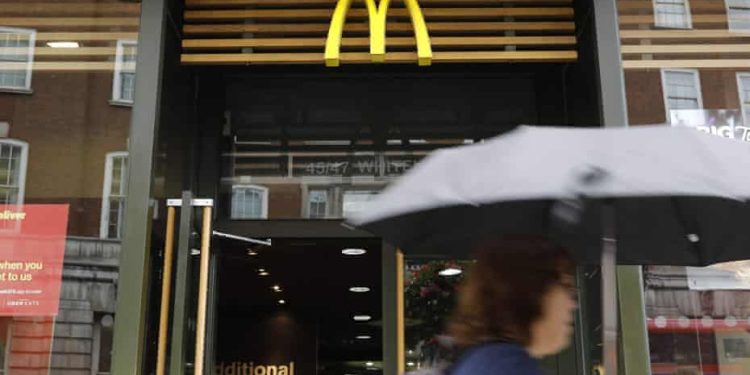Families struggling to cope with energy bills are seeking shelter in McDonald’s, with one charity saying hard-pressed parents and children are spending their evenings in the fast food restaurants, relying on the facilities as an emergency kitchen, bathroom and living room.
“People are buying their kids a Happy Meal for a few quid and keeping them warm inside. Then they wash and brush their teeth in the sinks and watch television for hours on the free wifi,” says Matthew Cole.
Cole is the chair of the trustees of the Fuel Bank Foundation, a body which tries to help families with their bills, currently ballooning amid raging inflation. The realities of life for those in financial distress are stark – parents who take their children to leisure centres to use the showers without swimming, others hunched over tea lights to heat pans. Cole’s team has tried to persuade residents not to burn furniture or wooden pallets to keep warm, for worry they will set their homes on fire, but many feel they have no choice
Cole was originally in charge of dealing with vulnerable customers at energy supplier npower. He quickly realised that when customers had trouble paying bills they rarely turned to their energy supplier. “It’s a hidden problem – if a customer stops paying they rarely tell you why,” he says.
Instead, many of the 4.5m households using prepayment meters are “self-disconnecting” by sitting cold in the dark. The Fuel Bank Foundation is now independent, funded through a mixture of grants, public funds and industry support. It does not have its own premises, instead tying up with existing providers of foodbanks and community support such as the Trussell Trust and Citizens Advice through 350 sites around the country.
It has helped more than 500,000 people. After assessing their needs, people are usually given funds electronically to cover seven to 10 days of energy supply. They also get help speaking to their energy supplier and applying for other forms of state support. “Fuel poverty is rarely the only issue, if you’re struggling with heating then you’re likely worrying about food and clothing too,” says Cole.
The foundation saw a 74% increase in inquiries on last year in the first three months of 2022.
Cole says a big goal is to prevent cash-strapped Britons turning to high interest doorstep lenders. Industry executives have already forecast a surge in bad debts if capped annual energy bills hit the £3,000 some have forecast in October. Citizens Advice says the average energy debt now stands at £1,450, up from £1,330 in 2020.
Research from British Gas and YouGov shows 40% of UK adults will struggle to make their next payment. There has been a crescendo of calls for government to help, and suppliers offer some support.
The biggest have hardship funds to offer grants, and Octopus Energy last month doubled the size of its pot to £5m. Jessica Taplin, chief executive of the British Gas Energy Trust – an independent charity funded by British Gas – says its backers’ desire to help has been “genuine”.
It received £6m in funding from British Gas last year, and has gained £10m already this year. The trust has tied up with rapper Professor Green to urge people to speak up if they are grappling with energy debts.
Taplin recounts the despair of those the charity has helped: the unemployed mother of four afraid to open billings emails for fear of taking her life; the bereaved Glaswegian man in tears over energy costs as he cared for his two pre-schoolers; the elderly Londoner who stayed in bed anxiously all day if a red bill hit the doormat.
“Much of the time helping people understand what support is already available is crucial,” Taplin says.
Jo Gilbert of utility bills advice group Cubes says struggling households need to ask suppliers not to put them into the “Dunning” process, which brings in debt collectors. “If you are struggling to pay for the energy you are using now there is no point in creating a debt repayment plan – you simply won’t pay it off,” says Gilbert, a single mum who scraped by after escaping an abusive relationship in the 1990s.
Energy suppliers can electronically top-up prepayment meters or send engineers to “wind on” prepayment meters to give people extra power, although this is a costly measure they may be reluctant to take. But Gilbert cautions: “In reality, we’re way past using energy-saving tricks at home to limit bills significantly. People need government help now.” The Guardian











